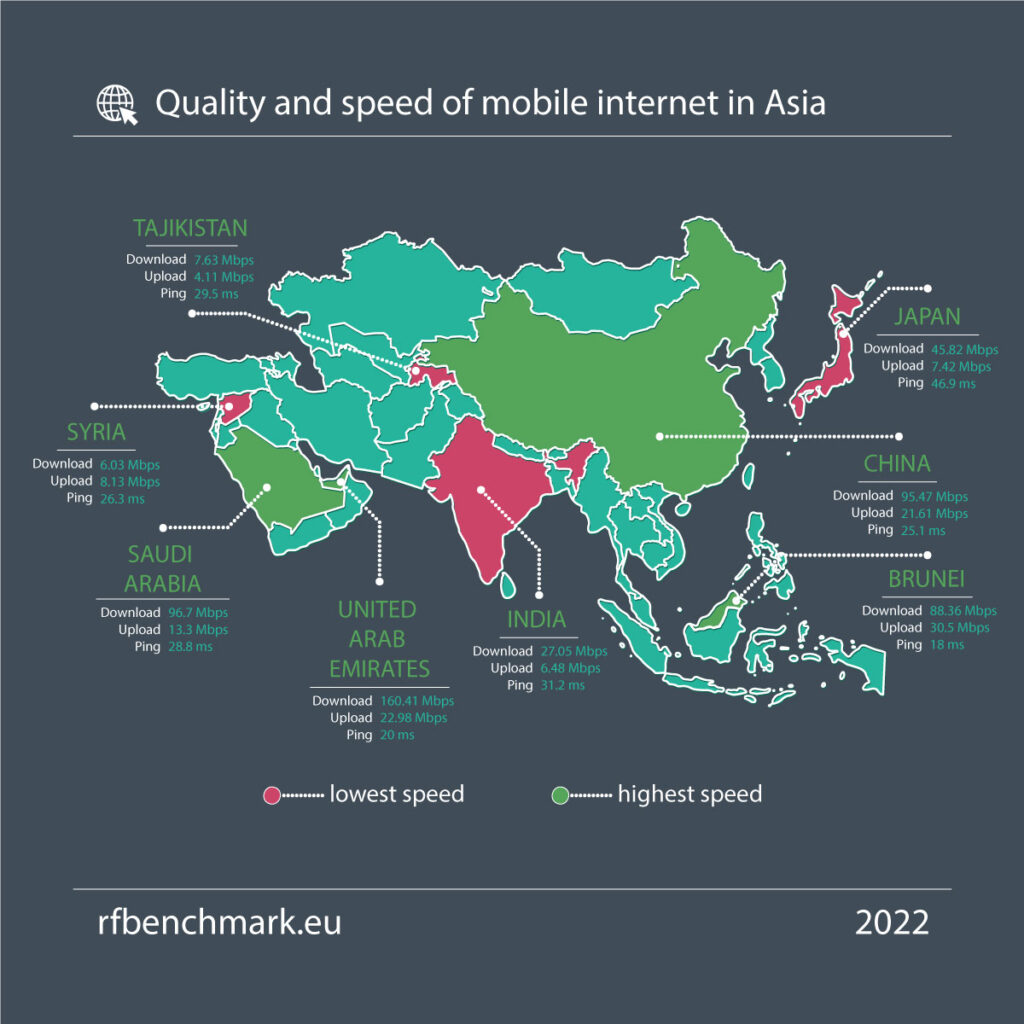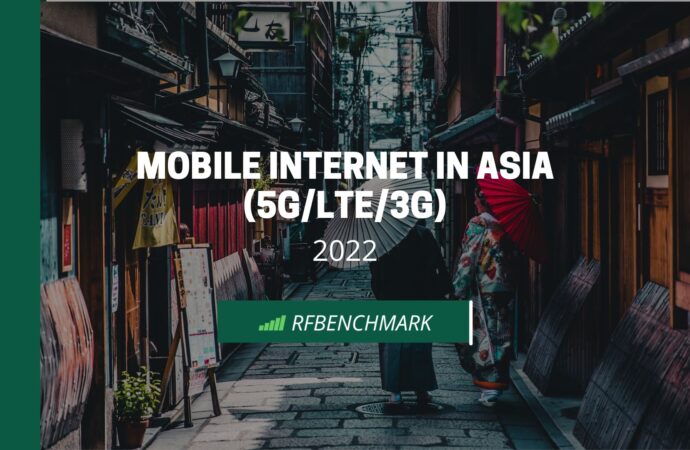In recent years, Asia has emerged as one of the world’s fastest-growing economic regions. As a result, the demand for fast and reliable mobile Internet has also surged. To meet this demand, governments and telecommunications companies in the region are investing in network infrastructure, which has led to improved quality and availability of connections.
Moreover, advancements in mobile technology, including the deployment of 5G, have helped to further enhance Internet connection speeds. Telecom companies in Asia are introducing more and more solutions, such as beanforming and Multiple Input Multiple Output (MIMO) technology, which enable better bandwidth utilization and increase network capacity. Highly developed Asian countries are now one of the key driving forces behind the 5G technology revolution.
Our report summarizes the state of mobile Internet quality and speed in Asia in 2022. We have analyzed three key indicators – average data download speed, average data upload speed, and average ping value.
Read also: Quality and speed of mobile Internet in Europe – (H2 2022)
Average data download speed: United Arab Emirates (160.41 Mbps)
The best-developed mobile Internet networks can be found in the Middle East and on the Korean Peninsula. Countries such as the United Arab Emirates, Qatar, and South Korea lead the way in terms of average data download speeds. In the United Arab Emirates, the average speed was 160.41 Mbps, while in Qatar it was 153.22 Mbps. South Korea ranked third with 122.7 Mbps.
However, there are still Asian countries where mobile Internet access is a luxury. Economic and political factors such as armed conflicts and lack of stable goverments are major obstacles to network development. Syria achieved an average mobile Internet speed of just 6.03 Mbps, Tajikistan – 7.63 Mbps, and Yemen – 8.58 Mbps.
Average data upload speed: Brunei (30.5 Mbps)
In terms of the average data upload speed, Brunei was the leader with an average speed of 30.5 Mbps. Kuwait and Qatar followed with 23.54 Mbps and 21.65 Mbps, respectively.
On the other hand, some countries had very low average data upload speeds. Sri Lanka achieved a score of 5.5 Mbps, while India’s was 6.48 Mbps. The worst result was recorded in Tajikistan, where the average upload speed was just 4.11 Mbps.
Ping: Brunei (18 ms)
The average ping value is one of the three key indicators of mobile Internet quality, affecting the network flow and latency. Brunei performed the best in this category, with an average response time of just 18 ms. It was followed by the United Arab Emirates (20 ms) and Qatar (20.1 ms). As you can see, the Arabian Peninsula enjoys very good mobile network conditions.
On the other hand, economically and politically troubled countries tended to have lower scores. Yemen and Nepal are both underdeveloped countries with energy access problems and lack of stable governments. Nepal recorded an average ping value of 55.3 ms, while Yemen recorded 37.3 ms.
It might come as a surprise that one of the weaker scores in this category was recorded by Japan. Despite being one of the world’s largest electronics manufacturers and a country with one of the world’s largest economies, it scored below expectations at 46.9 ms.

Read also: Mobile Internet in Poland 5G/LTE/3G (January 2023)
| Country | Download | Upload | Ping |
|---|---|---|---|
| Afghanistan | n/a | n/a | n/a |
| Saudi Arabia | 96.7 Mbps | 13.3 Mbps | 28.8 ms |
| Azerbaijan | 31.56 Mbps | 8.8 Mbps | 24 ms |
| Bahrain | 95.43 Mbps | 15.96 Mbps | 30.1 ms |
| Bangladesh | 15.58 Mbps | 11.51 Mbps | 25.8 ms |
| Bhutan | n/a | n/a | n/a |
| Brunei | 88.36 Mbps | 30.5 Mbps | 18 ms |
| China | 95.47 Mbps | 21.61 Mbps | 25.1 ms |
| Philippines | 23.29 Mbps | 7.67 Mbps | 24.3 ms |
| India | 27.05 Mbps | 6.48 Mbps | 31.2 ms |
| Indonesia | 17.91 Mbps | 10.7 Mbps | 23.6 ms |
| Iraq | 29.49 Mbps | 16.82 Mbps | 25.1 ms |
| Iran | 19.93 Mbps | 9.74 Mbps | 34.2 ms |
| Israel | n/a | n/a | n/a |
| Japan | 45.82 Mbps | 7.42 Mbps | 46.9 ms |
| Yemen | 8.58 Mbps | 7.17 Mbps | 37.3 ms |
| Jordan | 23.36 Mbps | 13.93 Mbps | 22 ms |
| Cambodia | 19.67 Mbps | 8.33 Mbps | 21.2 ms |
| Qatar | 153.20 Mbps | 21.65 Mbps | 20.3 ms |
| Kyrgyzstan | 16.74 Mbps | 8.75 Mbps | 25 ms |
| South Korea | 122.70 Mbps | 15.88 Mbps | 31 ms |
| North Korea | n/a | n/a | n/a |
| Kuwait | 100.78 Mbps | 23.54 Mbps | 20.1 ms |
| Laos | 30.23 Mbps | 13.9 Mbps | 28 ms |
| Lebanon | 30.26 Mbps | 16.54 Mbps | 28.5 ms |
| Maldives | 66.53 Mbps | 16.90 Mbps | 23.2 ms |
| Malaysia | 41.7 Mbps | 8.09 Mbps | 28.3 ms |
| Myanmar | 28.20 Mbps | 12.44 Mbps | 27.5 ms |
| Mongolia | 13.47 Mbps | 12.88 Mbps | 23.85 ms |
| Nepal | 14.36 Mbps | 7.25 Mbps | 55.3 ms |
| Oman | 47.83 Mbps | 10.9 Mbps | 30 ms |
| Pakistan | 17.48 Mbps | 11.8 Mbps | 32.7 ms |
| Singapore | 76.76 Mbps | 17.54 Mbps | 26.6 ms |
| Sri Lanka | 13.33 Mbps | 5.5 Mbps | 21.2 ms |
| Syria | 6.03 Mbps | 8.13 Mbps | 26.3 ms |
| Tajikistan | 7.63 Mbps | 4.11 Mbps | 29.5 ms |
| Thailand | 40.08 Mbps | 14.85 Mbps | 28.4 ms |
| Eastern Timor | n/a | n/a | n/a |
| Turkmenistan | n/a | n/a | n/a |
| Uzbekistan | 19.38 Mbps | 12.73 Mbps | 27.23 ms |
| Vietnam | 44.23 Mbps | 18.25 Mbps | 26 ms |
| United Arab Emirates | 160.41 Mbps | 22.98 Mbps | 20 ms |
How did we collect data for the ranking?
The measurements are collected from the users of our mobile app. It allows us to measure basic mobile network parameters – including signal level and quality depending on the technology used by the mobile device, information about the mobile network operator, or the country where the smartphone is located. In addition, on-demand measurements of data download and upload speeds, as well as a latency test, are performed. When the app notices a low-quality voice call, lack of mobile Internet service, or other services, it has the ability to report the user’s current position where the problem occurred.
2 comments









2 Comments
Myo Han Zaw
13 May 2023, 05:39connect
REPLYMarcella Leffler
9 November 2023, 10:53"Broadband internet service in Bangladesh has truly transformed the way we connect and communicate. The high-speed connectivity has opened up endless possibilities for businesses and individuals alike. Exciting times ahead for the digital landscape in Bangladesh!"
REPLY